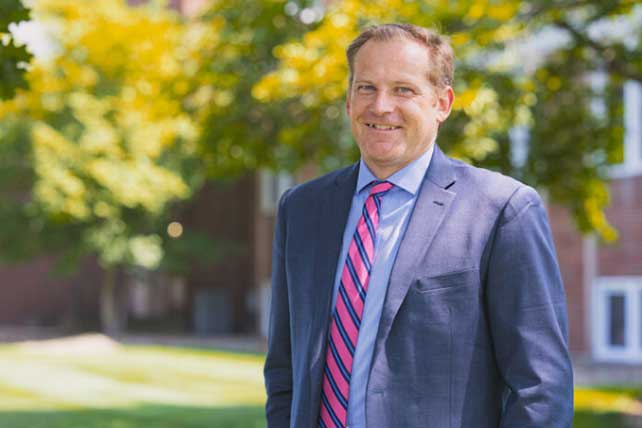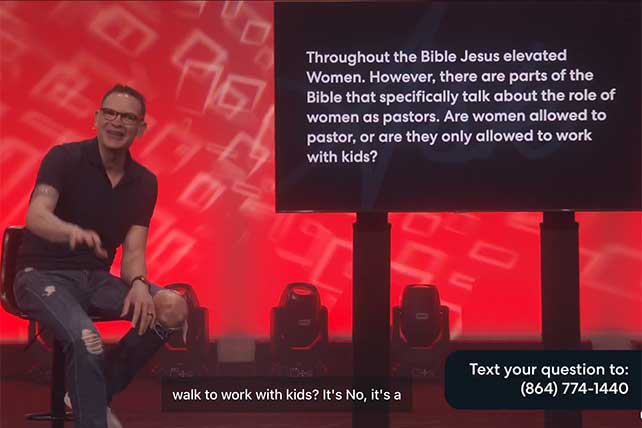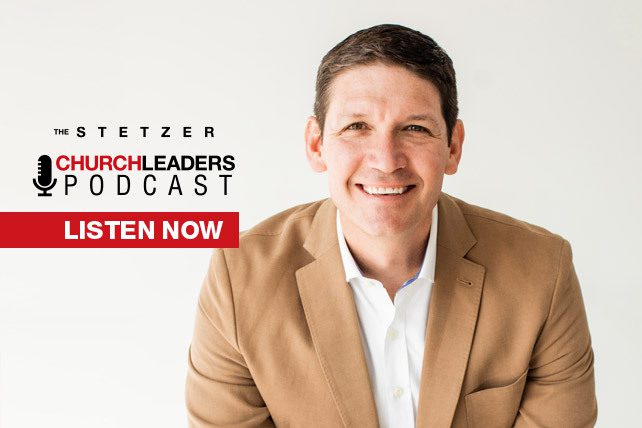Matt Chandler on The Stetzer ChurchLeaders Podcast.mp3: this mp3 audio file was automatically transcribed by Sonix with the best speech-to-text algorithms. This transcript may contain errors.
Voice Over:
Welcome to the Stetzer Church Leaders Podcast, conversations with today’s top ministry leaders to help you lead better every day. And now, here are your hosts, Ed Stetzer and Daniel Yang.
Daniel Yang:
Welcome to the Stetzer Church Leaders Podcast, where we’re helping Christian leaders navigate and lead through the cultural issues of our day. My name is Daniel Yang, national director of Churches of Welcome at World Relief. And today we’re talking with Matt Chandler. Matt is an elder and lead pastor at the Village Church in Flower Mound, Texas, and the executive chairman of the acts 29 network. He’s authored several books, including his latest, The Overcomers God’s Vision for You to Thrive in an Age of Anxiety and Outrage. You can sign up for Matt’s newsletter and check out his podcast, The Overcomers at Pastor Matt Chandler Comm. Now let’s go to Ed Stetzer, editor in chief of Outreach Magazine and the dean of the Talbot School of Theology.
Ed Stetzer:
Well, Matt, thanks again for being back on the podcast. And I just got to start at the beginning. Well, maybe at the end. Book of revelation. Like, really like like how many people are writing a book of revelation book in 2024? That’s nothing like this. So tell us why the Book of Revelation fits into this.
Matt Chandler:
Well, so I think what was driving me in the beginning was I wanted a pastors and leaders, and then the everyday man or woman in the pews to remember and grasp, uh, that like as as janky as this moment of history is, uh, it’s our moment. Uh, and that that, like, no one’s coming to bail us out of this like we are God’s big plan for this exact situation. Um, so C.S. Lewis isn’t coming. G.k. Chesterton isn’t coming. They might not do well if they were here. Uh, it’s been given to us, and and I saw, like, almost everywhere I was looking, I saw either a, um, an acquiescing to culture or just a shut down and be silent because we don’t want to. I don’t know if we’ll have time for this, but I see, like, the false gospel of, uh, empathy and compassion. Um, I don’t mean that we’re not to have those things because we are. But I think when the world defines those terms, and then you lay that across our faith, you get people that acquiesce or get silent. And I think if we do that, we’re going to miss this moment. So that was the driver. Um, and and then in some other reading, I was doing it, it clicked that, oh my gosh, the book of revelation for 2000 years has been given to God’s people for such a time as this, to put steel in our spines, to let us see the victory of Christ, to encourage us in the mission. And it’s only been in the last 150 years. It’s been hijacked by what I would call some janky theology. Um, not trying to start a fight with anybody. I’m just saying it’s 150 years old, and I just think we should be a little bit more skeptical of that. It’s 150.
Ed Stetzer:
Years old. You’re talking about a pre-tribulational view. You’re talking about millennialism. That’s I think.
Matt Chandler:
No, no, no, those those things go all the way back more the dispensational kind of idea of reading revelation through the lens of the, the newspaper. Okay. Um, and and so maybe even it’s those two are separate things. Um, maybe there’s far more. In fact, I probably there probably I probably overstated there probably is far more people who read revelation through the newspaper rather than read the newspaper through revelation. Yeah. Um, and so like, gosh, we just got a prime example of that in the eclipse where my office even got called going. Do you want to speak into the spiritual significance of the eclipse? And I’m like, this is back in April.
Ed Stetzer:
And of course, as you now know, there was an eclipse. Those are you listening to other countries? It was an eclipse in America, which of course meant that it’s an eschatological sign for the rest of the world because of American dates and things of that sort. But yeah, it was a it was a little much. And I got to tell you, I even tweeted, does anybody really know anybody who says this? And then everyone pointed me to people that are saying this.
Matt Chandler:
They’re saying, yeah, yeah. So I, I wanted to. Right some courage, uh, into this moment and revelation does that, I think, better than any other book in the Bible, probably because of who is being written to and their moment of history. Um, and so that that’s how we got to. And then men I feel most comfortable in a text, uh, I feel most comfortable preaching out of a text, writing out of a text. Um, and so that’s just where I’m most comfortable. So I had this thing burning inside of me, and then I had this book of the Bible that’s been given to the church across, you know, human history to build her up this way. And so to me, they married perfectly. Yeah.
Ed Stetzer:
And I think a lot of Christians don’t know what to do with the book of revelation. And so I like I like that you leaned in on that. But the burning question that I think you need to answer before we can even decide if we want to have any more conversation with you. Amil post mill, pre mill, are you pre mill like Jesus and all the disciples were or some other crazy view that you have.
Matt Chandler:
Uh, okay, we’re going to go straight for the millennial reign, huh?
Ed Stetzer:
Let’s go for it. Just I just want to know then we can get to the themes of the book. But right now, this is what people decide whether or not to listen to anything else I say. Based on your millennials, I am.
Matt Chandler:
I am most amil to anything else. Although I’ve got a lot of post mill sympathies.
Ed Stetzer:
Thank you for taking the time, everybody. Thanks for being on our podcast. We’re going to wrap it up here as well. All right. And I know.
Matt Chandler:
Where you land.
Ed Stetzer:
I got pre mill I got pre mill just like the early church. You know it’s kind of a thing. But anyway but I don’t. And I think the key thing is is and even throughout this and I really want to encourage to people to check out the book again it’s called The Overcomers God’s Vision for You to thrive. And then it kind of brings right to today in an age of anxiety and outrage. So it’s not really a book about eschatological signs or things of that sort. It’s it is talking about overcoming. But but again, there’s so many even in the title like, like what’s our posture in overcoming and matter of fact, when you say you talk about little postmill in there, I mean, some of what our posture is, you know, you sort of talk about being courageous and confident a lot, and there’s a whole lot of people who don’t like you and me who say that they got it. This is what courageous and confident looks like. And then you’re saying we should be courageous and confident. And then some people say, well, we should be courageous is to is to lose well and just take the culture as it comes. So how would we be courageous and confident in 2024 and beyond when that means different things to different people?
Matt Chandler:
Yeah, and this is where I think, like the Bible has to define our terms and and not this current moment defining our terms. Uh, and so what, what you see, um, early on in the book of revelation is a call to both contend with, uh, and to live in a way that is opposite of the prevailing culture of their day. In fact, in each one of the letters to the churches, I get the phrase overcomers from the letters to the churches wherein each one he’s like and to he who overcomes I will give to he who overcomes, I will give. And in each one of those instances, he’s calling them actually to stand against cultural norms as as a picture of God’s good design and beauty. Uh, and so I certainly am not I am certainly not a person that says you should just go with. But I’m also not the guy that says you need to pick a fight with everybody out there. There’s there’s something to faithful presence and faithful proclamation, um, that produces the kind of fruit that, that Jesus is calling us to. So even if you think about, um, the early church, so 96 AD, the 30 years of immense persecution, uh, like, what you get is a picture of a group of people that are, um, bearing all these trials with a fierce tenacity.
Matt Chandler:
They’re not giving in to it. They’re multiplying quietly. They’re building order while their enemies generate chaos. They’re fighting the sword with the word brutality, with hope. Uh, and and by doing that, they defeated the strongest state that history has ever known. And so I read this little quote, um. Oh, gosh, I think it was Will Durant in his story of civilization that Christ and or Caesar and Christ had met in the arena, and Christ had won and he didn’t win, or Christ didn’t win with the sword, and he didn’t win. He he won with a ferocious, everyday faithfulness of average people, not blue check famous charismatic communicators that are bold in the sense that maybe some people would call you or I bold. No, this was this was, um, this was a faithful blacksmith. Uh, this was a, uh, a faithful housewife. This was a a faithful, stay at home mom, if you will, living the gospel out faithfully in their neighborhoods, in their workplaces, refusing to capitulate to the culture while simultaneously. Creating with their lives a plausibility structure that ran contrary to the cultural norms.
Ed Stetzer:
So is is this some might ask? So I’ll ask, is this like a dog whistle to say have faithful presence. Don’t get too much involved in politics. Don’t get too caught up in arguing. Kind of calm down a little. You use the word outrage in the title. Um, is this a dog whistle that we’re getting too involved in some of those things. I mean, it is 2024, so no. Yeah, I.
Matt Chandler:
Know, I know, no, I don’t I don’t think that’s what I write or I have that in view while I write. Now here’s what I’ll say. I probably have that in view for some folks. Yeah. Um, but certainly not as like the normal way of operating. I, I think we’re called to be faithful citizens where we are. And I think policy matters because people matter. Uh, and I think there’s types of policies that Christians everywhere should fight for. And I think there are types of policies where Christians everywhere should fight against and I also think this has been true throughout Christian history. It’s not just the mess we’re in in 2024. Uh, and so no, this isn’t hey, everybody sit down and just be sweet, nice people. Uh, this is to live boldly in our day, pointing out truth and reality wherever we can.
Ed Stetzer:
Yeah. And overcome is that language means different things to different people, right? So there are people who are overcoming the forces, and they’re overcoming the forces by, by, by any means necessary in some of their mind. But you actually define this and you look this, the qualities you see in Scripture. So what are some of the qualities that you’re bringing forth as an overcomer? Yeah.
Matt Chandler:
So I think the main one that I’m trying to embed in the imaginations, and maybe for the preacher teacher in their mouths, uh, is a perpetual surrender to the rule and reign of God in our lives, especially when it’s hard. Um, and so the way that we primarily overcome it is to repeatedly surrender to the reign and rule of God. Because Paul’s language is unbelievably political. Uh, Jesus’s language is unbelievably political. That little Jesus is Lord phrase. You can throw that on a red hat. Uh, I mean, it’s a, you know who’s not Lord, if Jesus is Caesar. Um, and and even in even in revelation specifically, when you get into chapters 12 and 13, um, clearly what’s in view right there is Rome and then the imperial cults in Rome. So these religious bodies that are going to put your trust in the government, put your trust in the government, put your trust in the government. So what we’re seeing in the book of revelation, and I think what’s right and good for today is wherever God has uniquely placed us in this moment, uh, our role is a repeated surrender to the rule and reign of God in our lives. And I think overcoming is doing that, especially when it’s hard and not look for the way to be silent or to acquiesce.
Ed Stetzer:
Yeah. And I think I think it’s, um, I think it’s going to be hard. I think 2020 4th May be some of the peak of our cultural convulsion. I think we’re probably better prepared as churches where we’re a little less prepared in 2020. But I mean, the culture we, you know, the months ahead of us could be some of the most tumultuous in our lifetime. Where and it’s not just like American politics, but we’re talking about, you know, war. We’re waiting for war in Asia. We’ve got a war in the Middle East, we’ve got war in Europe. So, you know, this is where I think, you know, I’ve been teaching, you know, uh, Wednesday night we’re doing a series on the renewal of all things, just a series I did at church. And, um, and you can’t talk about those things without talking about revelation a lot and what it looks like at the end of the book of revelation. But there’s always this draw. Maybe it’s a Southern California thing. People are like, could you talk more about the book of Revelation in the End Times? And you kind of resisted that urge? I made you have a little fun with me and talk about millennialism, but sure. But you kind of resisted that urge. So is that something? Because remember, our audience is pastors and church leaders. Um, how how should they speak of these things? And why then did you even go to the book of Revelation? I mean, I know you love to work through a book, but but the book of revelation just conjures up so much else. How can pastors talk about our current moment without fueling that kind of. It’s all, you know, any moment. It’s all Jesus is going to come. Well, I want I want them to live as if Jesus is going to come back. But I think you understand my question.
Matt Chandler:
I do. Yeah. Well, I think you’ve got to let revelation be what it is. And and what I mean by that is in the first five, six chapters, you find out what it is like. We know it’s a letter. I mean, he’s clear. This is who I’m writing to, to the seven churches of Asia minor. It’s a prophecy, but not so much a this is what the future is, although there is plenty of that in the book of Revelation. It’s more thus saith the Lord. I mean, gosh, even in the first five verses he says, and he who does the things that are in this book, so it’s a book of discipleship. And then lastly, it’s an apocalypse, right? It’s an unveiling. And that unveiling, though I found in study, is not just what’s how this is going to end, but what’s true. Right? Now the unveiling is the victory of Christ right now, regardless of what we see. Uh, and so he’s certainly saying to the original hearer, no matter how great the Empire of Rome looks to you, Christ is on his throne, and all history and creation is moving towards him in worship. And that’s available to us right now. That’s not some future happening. That’s true right now. And so if those are my lenses, and the apocalyptic literature in revelation is mostly pointing backwards, not forwards, uh, I think I read in one commentary there’s over 500 allusions to the Old Testament. In the book of Revelation, Eugene Peterson went so far as to say there’s nothing in revelation that hasn’t already been said somewhere else in the Bible. Uh, if we approach it that way, then, then it isn’t as weird as I’m afraid. It’s been made over the last couple of years, and it gives us some confidence that the locusts probably isn’t the Apache helicopter.
Ed Stetzer:
I will, I mean, that’s what I was taught, so I don’t know how you can say that so.
Matt Chandler:
Well. Yeah, because nobody was wrong in the 70s about eschatology.
Matt Chandler:
But I.
Matt Chandler:
I think eschatology matters. I think we’re pulled forward with future hope. I think there’s a good right longing for eschatology. I think there’s a good right teaching of eschatology, eschatology, eschatology that strengthens the inner man. But I also think it’s a place that people they forget the present at the expense of and revelation read rightly doesn’t have you forget the present, uh, at the expense of the future. It anchors you in future hope for present boldness. And and I think that’s what the book does when it’s read through those three lenses of it’s a letter, it’s a prophecy, and it’s an apocalypse.
Matt Chandler:
Yeah.
Ed Stetzer:
And I think again, that’s I think what the overcomers does, again, it’s called the overcomers. God’s vision for you to thrive in an age of anxiety and outrage. You know, we don’t know. The book is clearly geared towards a broader Christian audience. And we don’t we actually don’t do a lot of interviews about books kind of geared towards a broader Christian audience. But, you know, partly I just wanted you to kind of articulate some of what that vision might look like for pastors and church leaders as well, because one of the things you talked about that I resonated with was that the Western church is under a sort of Satanic lullaby. Why don’t you unpack that a little bit as well? The Setzer Church Leaders Podcast is part of the Church Leaders Podcast Network, which is dedicated to resourcing church leaders in order to help them face the complexities of ministry. Today, the Church Leaders Podcast Network supports pastors and ministry leaders by challenging assumptions, by providing insights and offering practical advice and solutions and steps that will help church leaders navigate the variety of cultures and contexts that we’re serving and learn more at Church leaders.com/podcast network.
Matt Chandler:
Yeah, well, I when I wrote that, I was actually quoting, um, a, an Iranian house church leader, um, who was asked about the West. And I almost always have my antennas up about people dogging Western Civ. Uh, I mean, I think for all the good that we’ve brought to bear on the earth, we should get a little grace on some of the nitpicky stuff. But what he said, I thought, really resonated in my own heart, my own experience as an evangelical pastor, he said. It was like the West had been put to sleep, like it was napping, like it was on some sort of cruise ship. It was likened to, you know, John Piper’s famous kind of cruise ship versus battleship mentality. And this Iranian pastor basically described us as sleeping or being lulled to sleep a demonic lullaby, he says. And, and I think the majority of evangelicals that I come across are almost completely unaware of this cosmic war. They find their lives caught up in, uh, and it’s not a war of equal footing. It’s not a war where the outcome is not known, but but very much that there’s this battle in the cosmos. There’s this battle, um, behind what we can see, smell, touch, taste and experience. That is, um, God the creator, conquering his foes and humanity caught in the middle of it. And this Iranian pastor was saying that the Western church doesn’t seem to have any imagination for this. And I think that’s been that my I mean, pastored the same church for 22 years, been in ministry for 30 years now. The sheer volume of moral navel gazing that’s now been framed up as Christianity easily shows that we’re dead asleep to this reality of this cosmic war that’s being waged that we’re in the middle of. Yeah. So.
Ed Stetzer:
So I don’t disagree with that. But I would also say to the question is how do you respond to that? You know, um, we’re I’m a little older than you, but there’s a, there’s a very famous song by Keith Green called asleep in the light and come on. And I think, you know, that’s sort of where we are, you know, we are kind of asleep in the light, but I think I can find a whole lot of people who would say, that means you got to punch harder and fight harder and wage and maybe wage the culture war more. So you’re, you’re you’re coming to a it’s almost like you’re coming to us. The same conclusion of people who have concluded that the answer is very different from the answer that you’re bringing forward. So how do you explain that?
Matt Chandler:
Yeah. Well, I think what I’m trying to do is take my cues from the way that that the church in 96 AD took these cues. Uh, I don’t think. Like I can’t find anywhere that that I’ve read and researched. If you found it, it’s too late now you can let me know and I’ll have to write a couple of blogs going. Here’s where I missed it. And certainly I probably did miss some things. Um, the the church’s response to what they received from John, uh, was not let’s war against these temple prostitutes, let’s war against let’s let’s punch harder. And in fact, even that phrase earlier, they they fought the sword with the word right where their enemies generated chaos. They got set, creating order. Um, and so I think, honestly, one of the ways you can punch back, like, here’s something we do every October, it’s the most spiritually violent thing I think we do as a church. Every October, we have a month of prayer where we encourage all the families of our congregation to simply prayer, walk their neighborhoods, and pray prayers of blessings over each of the homes, whether they know the people or not.
Matt Chandler:
And then every Sunday night we gather together for worship and prayer together, and we’ll share testimonies of that prayer walking. And it has always led to salvation. It has always led to, um, spiritual conversations. It’s because they’re walking. And then here’s their neighbor. They hadn’t met. What are you doing? Oh, I’m praying a blessing over your house. Praying a blessing over your marriage. Oh, well, why would you do that? And now we’re. And not a single instance in five years of this. Has someone gone? How dare you? You keep those prayers to yourself. Well, this is the kind of spiritual combat that overcomers do, right? And I’m not saying there isn’t a time and place to punch harder. I’m just saying the way that the early church responded to the images and the the cries of God through John to the churches is not punch harder the way we think about punching harder. But but but to fight where the fights actually occurring, which is these principalities and powers as Paul labels them and what we see is the dragon and his two henchmen in, of course, revelation 12 and 13.
Ed Stetzer:
So and it’s interesting how many people will know, like all those references they know, but they know them from maybe books in the 70s. Uh, and you and you do take a very different take. And again, I encourage people to, to pick up the book. Uh, and again, it’s the overcomers, God’s vision for you to thrive in an age of anxiety and outrage. You’ve said 96 AD a few times, and I think in a sense, you’re how the church is responding at that cultural moment. So let me ask you, though, with because this would be, you know, we’re taking a different you know, people will take different conversation, different directions. Yeah. But for me, I’m it’s 2024 when this podcast will come out. So we’re trying to figure out what’s our posture in a culture that has become, you know, we’ve lost our home field advantage. Christians are on the other side of the cultural divide from the majority of culture. They’re often seen as the problem, not the solution. So so then I guess the question becomes is, is 96 AD and the instructions to the church, as you know, kind of the ways the very flowery descriptions of how do those instructions come, or are those the right time or is it should we look at Boniface when he goes in and cuts down the sacred oak of oak of Thor? Should we look at at you know, how Christians re-evangelize the continent and push back, uh, worshippers of Odin and other things, and sometimes went the battle to do that? So why 96 AD as this is what the church did, therefore we should do that.
Matt Chandler:
Yeah. So the the perspective I’m coming from is that the way they responded in 96 A.D. gives birth to maybe other lanes and other methodologies at other times. And so if I’m looking out at evangelicalism right now, its leaders and its people, I don’t see a ton of the bearing, all trials with fierce tenacity or multiplying quietly or building order while their enemies generate chaos. To me, it looks like we’re caught up in a meme war, uh, with people who are better at it than we are. Except, I mean, you’ve got a couple of. I’d leave the Babylon Bee alone. I think they they kind of punch at that level, but, um, the the enduring with brutality, uh, with hope. Um, that that’s the stuff that, you know, at last defeated the strongest state history has ever known. Um, and so even in the ones you’re naming, that doesn’t lead to, I think, what this way of leaning into God’s plan. And I would also argue that some of the examples that you are using are actually using the weapons of the enemy, and then you become the enemy. Okay. Uh, where this is the path where you I mean, I want to say you don’t become the enemy, but certainly Christendom created a whole new mess. Uh, and so maybe the reality that all of us are going to have to live under, um, is that thorns spring up even by the sweat of our brow. Uh, but that the best we can hope for, uh, is to live. Bold, normal Christian lives in our neighborhoods and workplaces and places of play, and to create order and multiply with depth as much as it depends on us.
Ed Stetzer:
Well, you know, you can tell that I’m on the same page. Uh, you know, we’ve talked about this, you know, uh, alone many times. Bold, normal Christian lives. So, so here’s now, now kind of flowing from that. Right. Because you preach this series that became the book. I think it was 21. Yeah. So, um, but now it’s 24. So how are you not going to re preach the series that you’ve released as a book? So how are you going to lead the Village church in the next few months? In what could be the most tumultuous time in your ministry? What are some ways you’re going to lead it and maybe draw from some of the things you learned in the revelation series? Yeah.
Matt Chandler:
So I my plan as of now and let me let me talk air war, not not all the other things. Um, uh, I hope to I do a three week series on the gospel every fall. It’s just a gospel primer. It’s if you read my first book, Explicit Gospel, I’m like, I don’t want to get away from this. So every fall we’re going to kick off, you know, numbers are up, the fall started. Everybody’s going to serve Jesus faithfully this fall or all at church again from summer break. I’m going to do a three week gospel primer, and then I’m going to go into a six week starting in October, AA6 week message on how to live faithfully in this moment that I’m calling Thrones and thorns. And my plan is to just walk through, um, really, the flow is going to be, you know, week one’s kind of creator equals king. Uh, and I want to show that that God’s right is to reign and rule over it all. Um, and then watch, watch him ordain or however we want to say it, Adam and Eve, to be those viceroys of that kingdom, and then watch sin break that into a thousand pieces. That’d be week one. Week two. I want to look at the Tower of Babel.
Matt Chandler:
I want to look at what happens when people say, we’ll make God come down and serve us. Um, and then in week three, after that, I want us to look back at revelation, uh, specifically at the two beasts that the dragon calls out of, you know, one out of the sea, one out of the dirt. And let’s talk about how the more governments make man the end, the more bestial they become, the more demonic they become. And, um, then after that week, I want to go over to Romans. This is the purpose of government. And it’ll be that week where I talk about how policy matters, uh, because people matter. And so there are certain policies that Christians should be behind, and there are certain policies that Christians should adamantly oppose. And I’ll give some examples of that to get myself in trouble, uh, because one party doesn’t own all the right ones. And, um, and, and then I want to move from there to Jesus Lord in week five. Like what? What is the Bible doing? What is Paul doing with this Jesus Lord thing? Because it’s a wildly political statement in, in the term in the time it was written.
Ed Stetzer:
But you have you have to explain. Not everyone will know that you mentioned that. But tell explain why Jesus is Lord.
Matt Chandler:
So at the moment there were as Caesar comes to power, you’ve got all these, um, like kings and regents that begin to build temples to them and to curry favor and sometimes from the Caesar’s order itself, like I think of Vespasian and Vespasian was huge on Call Me Lord, I’m a God. And like this idea of Caesar is Lord was the way that you it would be. It was the Heil Hitler. It was the way that you greeted Caesar. Caesar is Lord. So to say that Jesus is Lord is to say that Caesar is not Lord. Uh, and it was probably depending on, you know, where you dig. It was probably one of the things that got Paul in prison. Um, and maybe even one of the reasons or maybe even why Paul thought he had done his job ending up in prison by creating these little bastions of ambassadors of the real king. Because the gospel in first Corinthians is Jesus is King, it’s that Jesus is the Messiah. He’s the fulfillment of Israel’s promise. And now, greater than that, he’s the king of the whole world. Which, of course, the Romans probably thought was the most absurd thing imaginable, that out of Judea could come some king of the world. Um, and so that will be week five, and then the last week is what it means to be an ambassador of this king in this day and age. How do you live? Faithless. So I’m going six weeks hard. Uh, I’m going to swing at it. I’m going to address Christian nationalism, which is just basically anything that’s conservative, I think. Let me say this. I think there actually is kind of Christian nationalism that’s absurd and out of control. But but I think by and large, we get bullied into not saying anything. Because anything a Christian says about politics now is framed as Christian nationalism to discredit. Which to me seems like a seems like a propaganda ploy. That’s pretty effective.
Matt Chandler:
Oh, yeah.
Ed Stetzer:
I, as someone who’s, uh, you know, written on on the issue of life in CNN and USA today and defended biblical marriage and USA today and more. And to see all that now under Christian nationalism, as someone who’s written about Christian nationalism, I know.
Matt Chandler:
Well, that’s the irony.
Matt Chandler:
Yeah.
Ed Stetzer:
They get lumped into that. But it’s you’re right, it’s a catchall. So and when this series you’re doing is this right for the election.
Matt Chandler:
Yeah. It’ll start in October. It’ll end right as the election is happening.
Ed Stetzer:
Well that’s, that’s a, that’s a that’s pretty aggressive. So I think a lot of pastors are thinking let me just kind of keep my head down through the election, maybe preach through, I don’t know, preach through the the book of Leviticus.
Matt Chandler:
So people will focus somewhere else, something easier.
Ed Stetzer:
Something easier. So so I mean, 2020, 2016 similar? Or is this sort of like a little more aggressive posture or what?
Matt Chandler:
I think I’m my bent is always to go right at something. Okay. Um, and I, I, and I would say if a pastor’s listening to this, I think. You need to know where you are. Like, I’ve been at the village church for 22 years, and we have endured some pretty epic highs and some pretty terrible lows, and I have just a lot of leeway to go at them like this. I think if you’re in year one, I would maybe figure out a way to do something, but maybe not being as aggressive as I’m describing. Uh, I just think that’s why, you know, even Jesus said to his disciples once, I have other things to say, but you’re not ready to hear them. Uh, and so maybe you do a series on the Imago day and, and you’re just talking about you can come at some things through a series on the imago day.
Ed Stetzer:
Yeah. Or bring in a guest speaker. I was I was asked to preach at one large church in Illinois, like a couple weeks before the election. And then they told me the topic just a couple weeks out, we want you to preach on the election. I’m like, what? What? You know, that’s your pastor’s job, not your guest speakers job. But no, you’re.
Matt Chandler:
Right, it was. Yeah, I’m sure you did great.
Ed Stetzer:
Yeah.
Matt Chandler:
Sure. Didn’t you?
Matt Chandler:
Cause you didn’t cause that guy any issues when you left?
Ed Stetzer:
No, no, I never do, I never do. I’m not. I’m not going to cause this guy.
Matt Chandler:
For.
Ed Stetzer:
Any of my friends.
Matt Chandler:
You’re not that guy.
Ed Stetzer:
So, um, so we’re kind of. We’re coming to the end. So come back to the empower. You know, the the overcomers theme. Excuse me? You know, because the pastors, you know, again, the book, for those of you who remember the overcomers, God’s vision for you to thrive in an age of anxiety and outrage. So how do pastors lean into that as an overcomer in their own lives? I don’t want to ask you how they teach their people to do that as well, but start with pastors.
Matt Chandler:
Yeah, I.
Matt Chandler:
Think the answers are going to be are going to be similar. Um, I think if pastors haven’t done that deep work, uh, around identity, um, and are still having some significant struggles with like accusation, internal accusation and comparison, it’s going to be really hard, um, to kind of live into this moment that we’re in. I need to know. And I don’t mean like theologically or intellectually. I need to know in my guts that before I’m anything else in this world, I’m a son of God. I am a child of the King, and I need to find great comfort in that and live to please him as opposed to others. Now, I don’t mean to believe that in such a way that you’re a fool. Uh, I just mean to have a real sturdy in my guts understanding of what my identity is and what it’s not. Um. Because, like. I can. I mean, if they can fire Jonathan Edwards, they can fire anybody. Um. And so. But can I preach and live and cast vision in a way that is faithful to Jesus and takes into account where the people that he’s asked me to shepherd are? Um, I need I just think brothers and sisters have to do that work. They have to know I’m.
Matt Chandler:
I’m secure in his love. I am not trying to earn the favor of God or for God to work in my church, or I’m. I am beloved by him, not some future version of me right now and and then, man I. I know the predominant atonement theory of the day, but there’s something about that Christus Victor that needs to be reclaimed. And if you look back, uh, on the early church and, and I just think they had something in that victory of Christ over everything because it feels to me like I’m I’m walking with 5 or 6 Gen Z guys now, and I’ve always got pastors in my orbit that I’m working with. There seems to be real anxiety about being canceled or being and and I like to and again, it’s why I love revelation. Revelation has the victory of Christ on display as the driving narrative of our lives, Christ enthroned. That’s why we keep returning to that throne room until it comes down to earth, either pre or post or middle or whatever. And but the the the scene is Christ on his throne, draped in ultimate victory that he then is handing that victory to his people. And and I, I want to grab hold of the victory of Christ and live out of that.
Matt Chandler:
And and you will, I think, preach, teach and lead differently with a robust understanding of just how significant and all encompassing the victory of Christ is, and then lead out of that. Otherwise, I’m I’m judging things on my victories and my losses, and those could be catastrophic. Uh, even my good victories could end up being catastrophic. Um, and so those are the things, especially with pastors, that I’m trying to help with is primary identity. You’re going to be a better preacher, a better leader, a better husband, a better dad. When when you understand who you are and who you belong to. And then I think this idea of the victory of Christ is just huge. I think it’s what drove the early church so often. I mean, that’s why you’re I mean, they I’ve read plenty about how really the, the resurrection was. So the focus more than the cross for the first several hundred years like it was. He’s alive. He beat death, he overcame the enemy. And and I’m not diminishing the cross. Of course, that’s how he did it. But the resurrection of Christ was this kind of the force, uh, that was bringing people into the kingdom of God.
Ed Stetzer:
The overcomers. God’s vision for you to thrive in an age of anxiety and outrage. I think it would be a good resource for pastors and church leaders. Listening. Matt, preciate you very excited that we just announced that the nine meeting that we now have an X29 Talbot School of Theology academic partnership. Excited about all the good things to come and appreciate you and the way you want to encourage pastors and church leaders. Thanks for coming on the podcast.
Matt Chandler:
Always good to be with you. Ed.
Daniel Yang:
We’ve been talking to Matt Chandler. Be sure to check out his new book, The Overcomers God’s Vision for You to Thrive in an Age of Anxiety and Outrage. Learn more about Matt and check out his newsletter and podcasts at Pastor Matt chandler.com. And thanks again for listening to this Church Leaders podcast. You can find more interviews, as well as other great content from ministry Leaders at Church Leaders Company and through our new podcast network at Church leaders.com/podcast Network. And again, if you found our conversation helpful today, I’d love for you to take a few moments. Leave us a review that will help other ministry leaders find us and benefit from our content. Thanks for listening. We’ll see you in the next episode.
Voice Over:
You’ve been listening to the Stetzer Church Leaders podcast for more great interviews as well as articles, videos, and free resources, visit our website at Church leaders.com. Thanks for listening.
Sonix has many features that you’d love including advanced search, upload many different filetypes, automated subtitles, generate automated summaries powered by AI, and easily transcribe your Zoom meetings. Try Sonix for free today.
















 What You Need, Is Not What You Think You Need
What You Need, Is Not What You Think You Need














